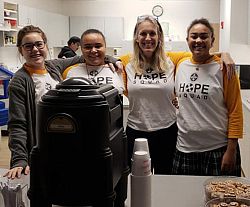Students offer HOPE to peers at St. Joseph CHS

OGDEN — “Hope” is a word that has many meanings, particularly in a Christian context, but for too many young people today, it’s an almost-alien concept. Burdened by the struggles of their lives, they often see no light, only darkness, surrounding them. To be a candle in that darkness is the goal of members of the St. Joseph Catholic High School HOPE Squad.
HOPE (Hold On, Pain Ends) Squad was started in the Provo School District in 2005 by educator Dr. Greg Hudnall. At that time, Hudnall, who had been devastated by an experience where he had to identify a 14-year-old student who had committed suicide, was seeking to find a way to address the issue in a meaningful way. After trying different approaches, he determined that a peer-based approach was most likely to reach at-risk students.
St. Joseph HOPE Squad members receive specialized training once each month for two hours where team members are taught to ask questions, to recognize the warning signs of someone at risk, to identify those students, then provide friendship and to seek help from adults when it’s needed.
This is the third year for HOPE Squad at St. Joseph CHS. Adviser Jennifer Hughes said she felt inspired to begin the squad after a student who was struggling came to her and expressed that there was no place to turn for them and others they knew who were dealing with similar issues.
“I just felt in my heart that I needed to take the ball and run with it,” Hughes said.
St Joseph High School lost a student last year to suicide, and there have been others in the past.
"That it is one of the reasons we continue to support this training and presence in our school," said Kari Lane, the high school's Alumni/Enrollment/Marketing Manager.
While intervention by adults can sometimes be valuable, often those who are suicidal will hide their feelings from the adults in their lives.
“What was discovered in the research is that students are much more likely to talk to each other, to see what’s going on on their social media platforms than adults,” Hughes said. “These students are on the front lines; they are our eyes and ears.”
Squad members can act as a bridge between at-risk youth and trusted adults who have the resources to help them. They can also reach out to students who are on the fringes and bring them into the school community.
This week the St. Joseph HOPE Squad advisory team is expected to meet and choose eight members (two from each class) to be this year’s squad from nominations submitted by their peers. This is different than many such processes: Hope Squad members are chosen not for their popularity, but for their kindness.
The concept of HOPE Squad was introduced to St. Joseph students this year at an Aug. 29 assembly. Next week they will participate in HOPE Week where squad members and students will create a HOPE wall in the school lobby filled with positive, life-affirming messages. They will also have a Wear Yellow (the color of hope) Day, along with other activities. Efforts like this have proven effective in reaching many isolated students in schools where there are HOPE Squads.
The squad also runs a monthly HOPE Café before school where students can enjoy hot chocolate, tea or coffee while interacting with squad members and their peers.
At St. Joseph’s, Hughes has seen a change in the culture of the school since HOPE Squad was introduced.
“Within the Catholic school system, it’s perhaps a little more delicate,” she said. “It’s something that takes time, to be able to feel comfortable having discussions about mental health in general, but this issue is something many people struggle with. It’s really important that students have a clear idea where to go. Now, because of HOPE Squad, overall there’s so much awareness.”
Hughes wants parents and grandparents to know that talking about suicide with young people is important and will not lead them to act on negative feelings. In fact, the opposite is true.
“There’s just a strong perception that discussion of these things can contribute to the problem but all the science reveals that the more culturally we’re not afraid to talk, to recognize it’s a problem that needs to be fixed, all the data points to seeing those numbers move downward,” she said. While there can be a stigma, “We want to save the lives of our students, so that’s what we are doing.”
HOPE Squad has a presence in half of Utah’s secondary schools and about 20 percent of elementary schools. There are now more than 500 squads in secondary and elementary schools in 18 states and Canada.
© Copyright 2024 The Diocese of Salt Lake City. All rights reserved.

Stay Connected With Us